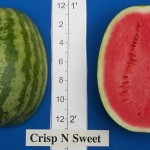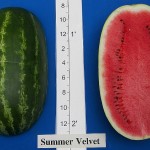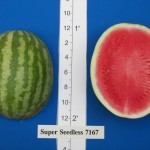Wednesday, July 2, 2006
by David Rodriquez
 Watermelon is popular, especially in hot weather, for its sweet, cool, juiciness. Cooled and eaten in slices, it makes a quick, no-cooking, delicious dessert or snack, perfect for a picnic, or it can be served as part of a mixed fruit salad. An attractive party dish is made by cutting the melon in half lengthwise, scooping the fruit into balls, cleaning out the rind, and filling it with the watermelon balls, cantaloupe and honeydew balls, coconut and berries. The fruit can be juiced and used as a base for fruit punch, ices or molded jellies. The watermelon can be used as a party centerpiece and portable bar by cutting a plug in it and filling it with vodka, gin or rum. The juice is sipped out of the melon with straws. Watermelon pickles, made from the rind, are popular. Of course, some people try to “sweeten” the juice of watermelon with the desired liquor; it is less filling and makes one happier.
Watermelon is popular, especially in hot weather, for its sweet, cool, juiciness. Cooled and eaten in slices, it makes a quick, no-cooking, delicious dessert or snack, perfect for a picnic, or it can be served as part of a mixed fruit salad. An attractive party dish is made by cutting the melon in half lengthwise, scooping the fruit into balls, cleaning out the rind, and filling it with the watermelon balls, cantaloupe and honeydew balls, coconut and berries. The fruit can be juiced and used as a base for fruit punch, ices or molded jellies. The watermelon can be used as a party centerpiece and portable bar by cutting a plug in it and filling it with vodka, gin or rum. The juice is sipped out of the melon with straws. Watermelon pickles, made from the rind, are popular. Of course, some people try to “sweeten” the juice of watermelon with the desired liquor; it is less filling and makes one happier.
Watermelon is much more nutritious than its name would imply. A wedge 4 X 8 inches .925 grams provides 2,510 International Units (IU) of vitamin A or about half the recommended dietary allowance (RDA). Such a piece also provides 30 mg. of vitamin C or two-thirds of the RDA. The iron in that amount of watermelon is 2.1 mg. or one-ninth of the 1974 RDA. At the same time, such a piece provides only 115 calories because watermelon is 93 percent water.
The composition of 100 grams of raw watermelon (edible portion), according to USDA handbook 8, is: “water, 92.6 percent, 26 calories; protein, 0.5 grams; fat, 0.2 g.; total carbohydrate, 6.4 g.; fiber, 0.3 g.; ash, 0.3 g.; calcium, 0.7 milligrams; phosphorus, 10 mg.; iron, 0.5 mg.; sodium, 1 mg.; potassium, 100 mg.; vitamin A, 590 IU; thiamine, 0.03 mg.; riboflavin, 0.03 mg.; niacin, 0.2 mg.; ascorbic acid, 7 mg.; magnesium, 8 mg.”
The following pictures were taken during Texas A&M field trials:
Remember, Learn and Have Fun!
David Rodriguez is an Extension Horticulturist representing Texas Cooperative Extension with the Texas A&M University System. For any landscape or gardening information, call the Bexar County Master Gardeners AHotline@ at (210) 467-6575, email questions to mg-bexar@tamu.edu, or visit our County Extension website at http:bexar-tx.tamu.edu



